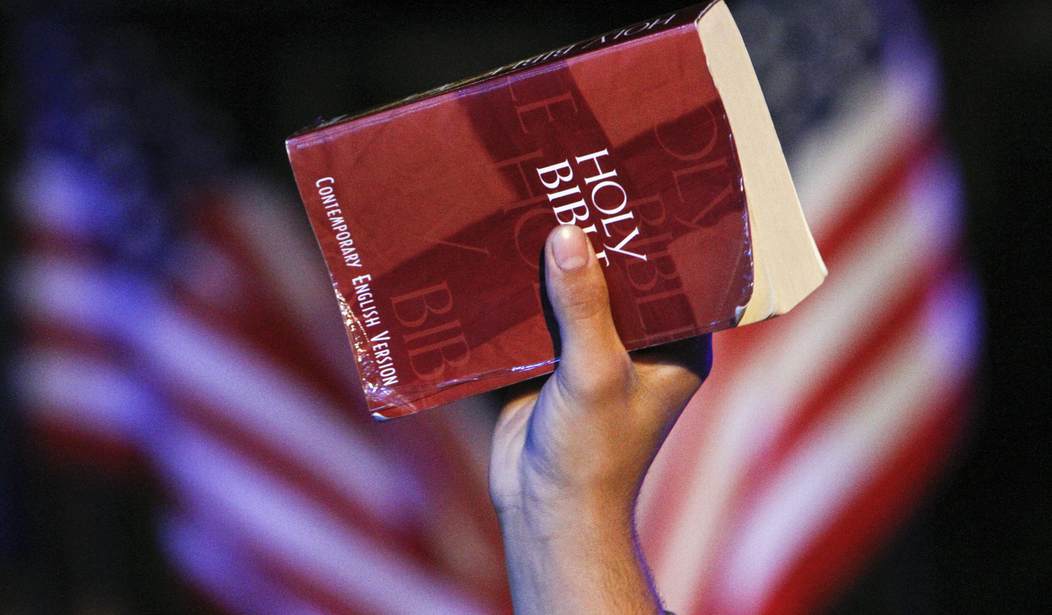We hear a lot about hate these days. It might be a “hate crime” against an individual or property. It might be “hate speech” about someone or something. But defining hate is difficult because it’s mostly subjective. It’s a little like what Supreme Court Associate Justice Potter Stewart said about defining pornography in 1964: “I know it when I see it.” But one definition of hate is easier to quantify, one denoting hostile actions motivated by intense dislike or prejudice. Using this criterion suggests government bureaucrats hate Christianity.
I don’t mean to be provocative, but recent events indicate they do. The latest example comes from the House Judiciary Committee, which announced on Wednesday that the Select Subcommittee on the Weaponization of the Federal Government is in possession of documents showing that our government is surveilling the financial transactions of people buying Bibles and other religious texts.
For what purpose does one surveil another? Surveillance ordinarily involves people who are suspected of something. That means our government is so concerned about people buying Bibles that it’s spending tax money to determine who they are. This sounds like a hostile action.
For all I know, this net of surveillance may have ensnared me. I wrote a check last summer to purchase some new hymnals for my church and wrote “Hymnal Fund” on the memo line. Aside from traditional Christian hymns, the books include Old Testament Psalms, reformed Christian prayers and creeds, and a confession of faith so that the government might classify it as a religious text. In the interest of conserving taxpayer money, there is no need to surveil me any further; I freely admit to buying Bibles and religious texts.
This week’s revelations about surveilling Christians are not isolated. We learned last summer that the FBI was spying on Roman Catholic churches because they were suspected of conducting mass in Latin. Catholics have done this for more than 1,000 years, yet the government believes this is suspicious enough to merit surveillance by men with guns. This, too, sounds a little hostile.
Recommended
There are many other examples of hostile actions against American Christians and their churches. From legislation that seeks to pierce the confidentiality of the confessional to a growing number of federal actions against people and institutions of faith, there’s a steady stream of hostile actions toward Christians.
I’ve received my share of unsolicited nastygrams from people who call me names, insult me, libel, and defame me, but I’m not sure whether they actually hate me. Candidly, I don’t care. People are free to disagree and believe whatever they wish; their beliefs are none of my business.
But someone’s beliefs become my business when they manifest themselves in hostile actions toward me. The hateful behavior of a couple of people is inconsequential, but the federal government is a whole different animal; they have rifles tactical vests, and prisons.
The surveillance and punishment of Christians for the crime of having and believing in the Bible is nothing new. If you live in a place ruled by the Taliban or Houthi rebels, Bible ownership is either illegal or severely restricted. China and North Korea also ban or restrict Bibles, as did the former Soviet Union.
The common thread that connects these nations is they all have authoritarian governments. Defectors report that entire families in North Korea, including a two-year-old toddler, are serving sentences of life in prison because the parents had a Bible. The Chinese Communist Party is a little less bad; a man who sold Bibles and other religious tracts was sentenced to seven years in prison. Bible readers in Afghanistan reportedly face summary execution.
This 'progressive' ideology is persecuting 21st-century Christians in a frighteningly regressive way, mirroring the Dark Ages and Medieval Europe. We’re not seeing news about Bible believers being burned at the stake, but summary executions and toddler imprisonment don’t seem like very progressive policies.
This all begs the question: Why is the government of the United States surveilling people buying Bibles and other religious texts? They must be doing it for some reason. Still, it’s unclear why the Treasury Department’s Financial Crimes Enforcement Network has “urged large financial institutions to comb through the private transactions of their customers for suspicious charges on the basis of protected political and religious expression,” extending to “the purchase of books (including religious texts).”
It pains me as a Christian to say this, but all these hostile actions make me wonder whether they really do hate us. I’m not suggesting we should expect the incarceration of two-year-olds or death sentences anytime soon. Still, I am reminded of the words of famed Irish politician and orator John Philpot Curran. As a lawyer arguing in defense of religious freedom, he observed, “The condition upon which God hath given liberty to man is eternal vigilance.” He’s not wrong.

























Join the conversation as a VIP Member